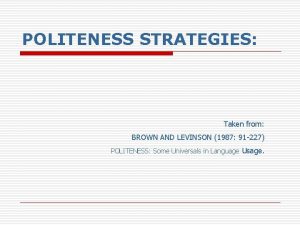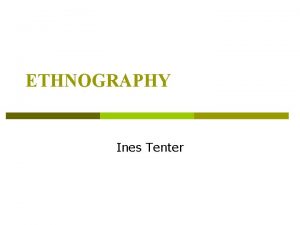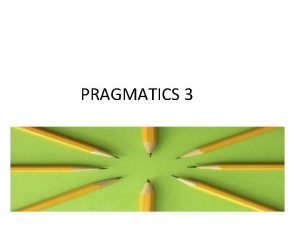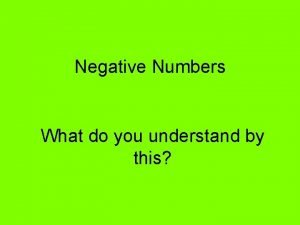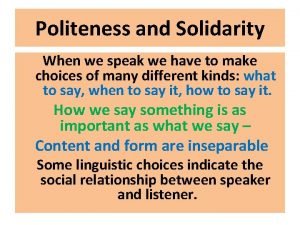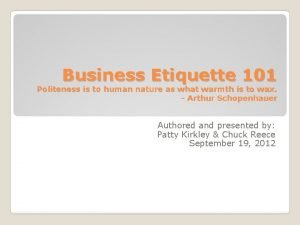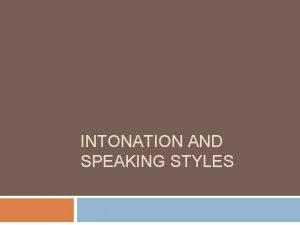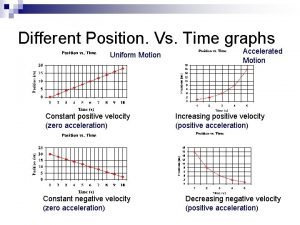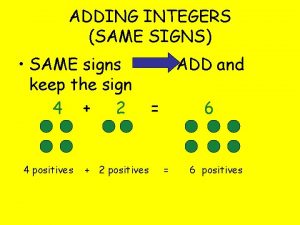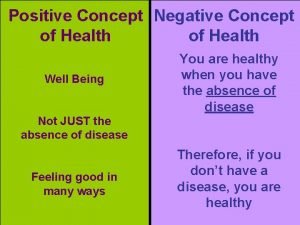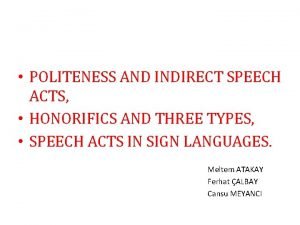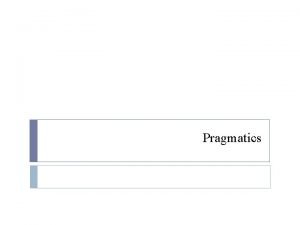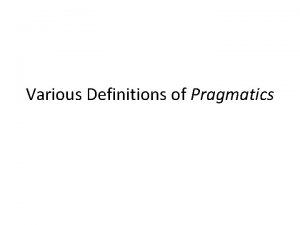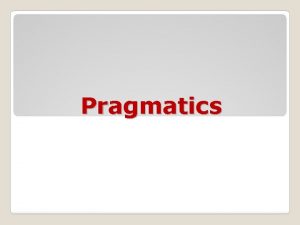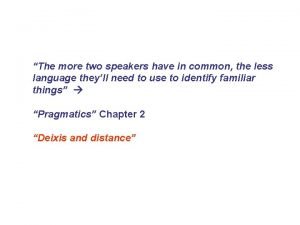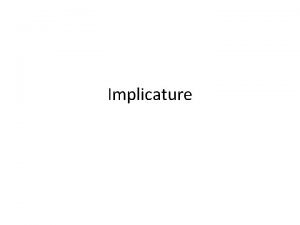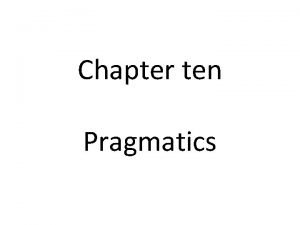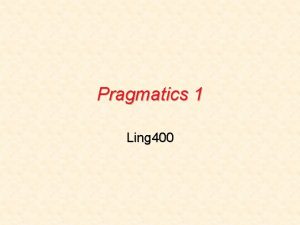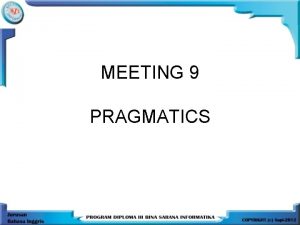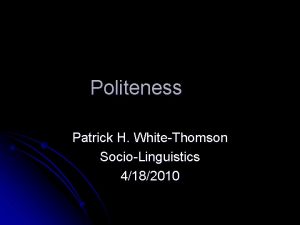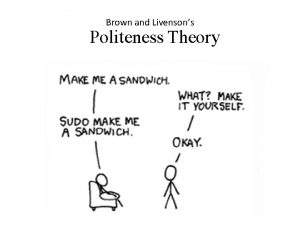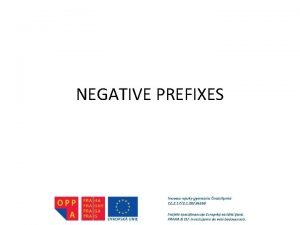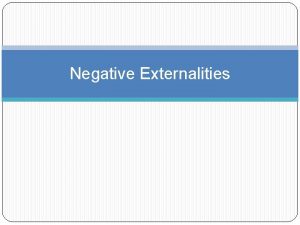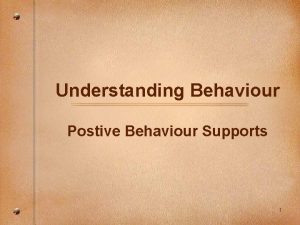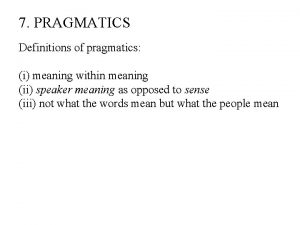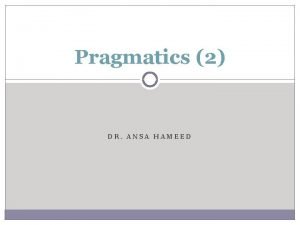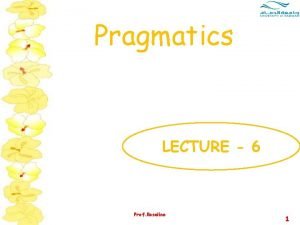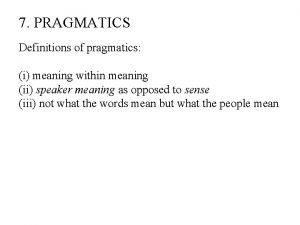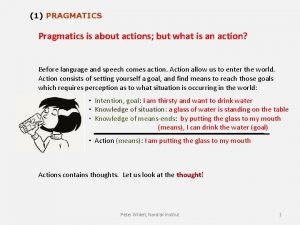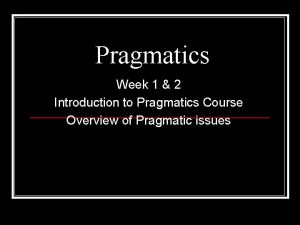POLITENESS PRAGMATICS Understanding concept Postive politeness Negative politeness




























- Slides: 28

POLITENESS PRAGMATICS

Understanding concept Postive politeness Negative politeness Maxims of politeness

INTRODUCTION In pragmatics, when we talk of politeness, we do not refer to the social rules of behavior. However, we refer to the choices that are made in language use, the linguistic expressions that give people space and show a friendly attitude to them. Look at the example of the politeness in page 44 -45

Politeness & Face Brown & Levinson (1987): in order to enter into social relationships, we have to admit, accept, recognize and show an awareness of the face, the public self-image, the sense of self, of the people that we address. Face refers to that emotional and social sense of self that everyone has and expects everyone else to recognize. It is a universal characteristic across cultures that speakers should respect each others’ expectations regarding selfimage, consider of their feelings, and avoid face threatening acts (FTAs). Politeness: the means employed to show awareness of another person’s face.

FTAs When FTAs are unavoidable, speakers can redress the threat with negative politeness that respects the hearer’s negative face, the need to be independent, have freedom of action, and not be imposed on by others. The other way, if such situation happens, is that the speakers can redress the FTA with positive politeness, that attends the positive face, the need to be accepted and liked by others, treated as a member of the group, and to know one’s wants are shared by others.

Avoiding FTA Gestur e • Non verbal • Avoid saying anything Verbal • Off record • On record

Off Record There are many ways of achieving one’s goals and showing an awareness of face. One of the ways is by saying something. Then there are two choices: to do the FTA on record or off record. If you do it off record, you ask something indirectly. Example: You are in a resource center trying to find a particular website but since you are having no luck, you would like one of your fellow students to help you. What will you do if you do it off records?

Example ‘I wonder where on earth that website is. I wish I could remember the address. ’ (in a loud voice so the neighbors can hear. ) This particular off-record communicative act is an indirect speech act in which you are using a declarative representative functioning as a question to yourself, that also needs the hearers to interpret it as directive, a request for help. This off-record communicative act also constitutes flouting of the maxim of quantity. (Explain this statement!)

Off Record Indirectness in the form of indirect speech acts and maxim flouting shows a speaker to make suggestions, requests, offers, or invitations quite casually, without addressing them to anyone in particular. The illocutionary force will most likely be understood by hearers, but they can choose to ignore it. Indirectness also enables speakers to address to particular people but be polite by giving them options and retreating behind the literal meaning of the words. (does it belong to negative politeness/positive politeness? )

Think of these examples! 1. “Interesting book. Pity I don’t have $30 on me. ” 2. “Why does no one ever throw out the rubbish in this house? ” 3. “Looks like someone had a good time last night. ” Hearers usually know what is implied, but they have the freedom to respond to it or ignore it, without losing face. In this sense, the speaker is showing a great awareness of face and not imposing much at all.

On Record – Baldly If a speaker makes a suggestion, request, offer, or invitation, in an open and direct way, it means that they are doing an FTA bald on record. These are direct speech acts; such utterances tend to contain the imperative with no mitigating devices, which leave the hearers little option but do as they are told or be seen as uncooperative. ‘This door handle’s falling off. Fix it. ’, ‘Give that note to me. ’ This is the most face-threatening mode of action.

On Record – Baldly Sometimes bald on record events can actually be oriented to saving the hearer’s face. ‘Have another biscuit’. , ‘Marry me. ’ the risk that the hearer may not wish to be imposed upon is small, and the FTA is quite pleasant. The directness also makes the hearer less reluctant to threaten the speaker’s face impinging through accepting. For this reason, the firmer the invitation, the more polite it is (Brown & Levinson, 1987). Besides directness often indicates a wish to be seen as socially close.

On Record – with Negative Politeness Negative politeness strategies pay attention to negative face, by demonstrating the distance between interlocutors, and avoiding intruding on each other’s territory. Speakers often use them to avoid imposing or presuming, and to give the hearer options. It can be done by emphasizing the importance of the other’s time and concerns, using apology & hesitation, or a question giving them the opportunity to say no.

examples ‘I don’t want to be nuisance, but could you possibly tell me the website address we were talking about this morning? ’ Sorry to bother you, I couldn’t borrow $30, could I, if you don’t need it right now? Feel free to come to the party if you have got the time.

Which one is more polite? I couldn’t borrow $30, could I, if you don’t need it right now? Could I borrow$30?

Using hedges ‘I sort of think that Fran is a bit of a mean person. ’ ‘Would you mind moving just slightly? I can’t see the screen very clearly. ’ Er, I think you may be late if you don’t go now.

Using Pre-sequence A : You know that French film that’s on in the Odeon? B : Yes? A : Do you want to go and see it tonight? B : Yeah, why not?

On Record – with Positive Politeness The aim is to save positive face, by demonstrating closeness and solidarity, appealing to friendship, making other people feel good, and emphasising that both speakers have a common goal. ‘Marky, you’re computer whiz-kid – I’d really appreciate it if you’d tell me the address for that website they were talking about this morning’

Positive Politeness is redress directed to the addressee's positive face, his desire that his wants should be thought of as desirable. Redress consists in partially satisfying that desire by communicating that one's own wants are in some respects similar to the addressee’s wants. The linguistic realizations of Positive Politeness are in many respects representative of the normal linguistic behavior between intimates

Examples Brown and Levinson: one of the types of positive politeness strategy is by claiming common ground. Speakers can do this by attending to the hearer’s interests, wants, and needs. ‘I know you hate parties, Jen, but come anyway. We’ll all be there, and it will be cool seeing if Ally is with Andrea! Come on – get a life!’

Relationship with Cooperative Principles The politeness strategy sometimes conflict with the cooperative principle. Speakers can violate cooperative maxims if they want to show positive politeness. A: How do I look? B: Good! (Thinks: ‘Awful’) “I’m terribly sorry to bother you but I couldn’t help noticing that you seemed to have a copy of the programme, and I wondered whether you wouldn’t mind me just having a look for a moment - I’d give it stright back to you. ”

How to get a pen from someone else Say something On record Face saving act Positive politeness (‘How about letting me use your pen? ’) Off record Bald on record (‘Give me a pen”) Negative politeness (‘Could you lend me a pen? ’) Say nothing (but search in bag)

Positive or Negative Politeness? “Hey, buddy, I’d appreciate it if you’d let me use your pen. ” I know you’re busy, but might I ask you if – em – if you happen to have an extra pen that I could, you know – eh – maybe borrow?

Positive or Negative Politeness? “You couldn´t give me a cigarette, could you? “ “Yesterday I ‘ve washed the dishes, so today it’s your turn!

FTA (Positive or Negative Politeness) or Bald on Record? Excuse me, do you mind terribly if I borrow one of your pens? Close the door! Is it perhaps possible that you pass me the salt? Is it okay if I borrow one of your pens? Can you close the door? Mind passing me the salt? Pass me the salt!

Off record/On record (FTA/Bald on record)? It would really be nice to have a pen. Wow, it's cold in here. Hey, can you be quite for a moment? These fries would taste great with some salt. Be quite! Sorry, would it bother you terribly to close the door?

Politeness Principle Leech (1983): 1. Tact 2. Generosity 3. Approbation 4. Modesty 5. Agreement 6. Symphaty

Tact Maxim Minimise cost to other (negative politness). Maximise benefit to other (positive politeness).
 What is a positive analysis
What is a positive analysis On record politeness
On record politeness Off record politeness examples
Off record politeness examples Negative politeness examples
Negative politeness examples Preference structure in pragmatics
Preference structure in pragmatics Understanding negative numbers
Understanding negative numbers Confucianism origin
Confucianism origin Politeness principle
Politeness principle Solidarity strategy in pragmatics
Solidarity strategy in pragmatics Spanish politeness
Spanish politeness Erving goffman face theory
Erving goffman face theory Corrective facework
Corrective facework Business etiquette 101: social skills for success indireme
Business etiquette 101: social skills for success indireme John hay open door policy
John hay open door policy Example of intonation
Example of intonation Constant leftward velocity
Constant leftward velocity When the signs are the same
When the signs are the same Negative velocity negative acceleration
Negative velocity negative acceleration Positive concept
Positive concept Direct and indirect speech acts
Direct and indirect speech acts Pragmatic examples
Pragmatic examples Pragmatics examples
Pragmatics examples Difference between semantics and pragmatics
Difference between semantics and pragmatics Semantics test with answers
Semantics test with answers Morris 1938 pragmatics
Morris 1938 pragmatics What is pragmatics
What is pragmatics Discourse deixis
Discourse deixis Conventional implicature
Conventional implicature What is pragmatics in linguistics
What is pragmatics in linguistics

